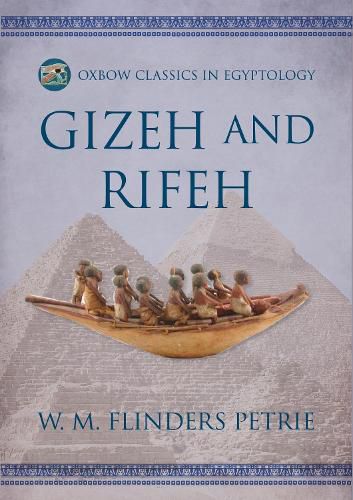Readings Newsletter
Become a Readings Member to make your shopping experience even easier.
Sign in or sign up for free!
You’re not far away from qualifying for FREE standard shipping within Australia
You’ve qualified for FREE standard shipping within Australia
The cart is loading…






Facsimile reissue of Flinders Petrie's 1907 account of excavations at Gizeh and at Dier Rifeh in Upper Egypt, just south of Asyut. At Gizeh excavations focused on a cemetery lying on a ridge about 1 km south of the Great Pyramid while work at Rifeh extended from a well-known Coptic village for about 5 km southwards to beyond the village of Zowyeh, and mostly investigated several cemeteries in the plain of mostly XIth?XVIIth Dynasty date. The area contained numerous Coptic settlements and the ruins of Coptic monasteries at Balyzeh and Ganadleh were excavated, producing many fragments of Coptic manuscripts. A chronologically ordered account of the tombs excavated begins with those at Gizeh followed by Zaraby and Zowheh and then Rifeh. Those at Rifeh produced around 150, previously rarely encountered, 'soul houses', being clay models of contemporary dwellings used as offering trays, which are discussed in detail. A classification of pottery is provided. Later burials were also excavated at the cemeteries close to Gizeh where three Demotic inscriptions and several cartonnages of papyri were recovered. The Demotic inscriptions and Coptic manuscripts are described with translations. AUTHORS: Sir William Matthew Flinders Petrie (1853?1942) was a pioneer in the field of 'modern' archaeology. He introduced the stratigraphical approach in his Egyptian campaigns that underpins modern excavation techniques, explored scientific approaches to analysis and developed detailed typological studies of artefact classification and recording, which allowed for the stratigraphic dating of archaeological layers. He excavated and surveyed over 30 sites in Egypt, including Giza, Luxor, Amarna and Tell Nebesheh. Sir Herbert Thompson studied Law at Cambridge but did not pursue this as a career, and then medicine at University College London where he met Flinders Petrie who encouraged him to study Egyptology. He specialised in Coptic and Demotic languages and became eminent in this field. He died in 1944. W.E. Crum was an expert in Coptic language who graduated from Balliol College, Oxford and then studied Egyptology in Paris and Berlin. He spent much of his career cataloguing Coptic materials in major museum collections and published a six-volume Coptic Dictionary. He assisted Flinders Petrie in the teaching of ancient Egyptian and Coptic at University College London. He died in 1944.
$9.00 standard shipping within Australia
FREE standard shipping within Australia for orders over $100.00
Express & International shipping calculated at checkout
Facsimile reissue of Flinders Petrie's 1907 account of excavations at Gizeh and at Dier Rifeh in Upper Egypt, just south of Asyut. At Gizeh excavations focused on a cemetery lying on a ridge about 1 km south of the Great Pyramid while work at Rifeh extended from a well-known Coptic village for about 5 km southwards to beyond the village of Zowyeh, and mostly investigated several cemeteries in the plain of mostly XIth?XVIIth Dynasty date. The area contained numerous Coptic settlements and the ruins of Coptic monasteries at Balyzeh and Ganadleh were excavated, producing many fragments of Coptic manuscripts. A chronologically ordered account of the tombs excavated begins with those at Gizeh followed by Zaraby and Zowheh and then Rifeh. Those at Rifeh produced around 150, previously rarely encountered, 'soul houses', being clay models of contemporary dwellings used as offering trays, which are discussed in detail. A classification of pottery is provided. Later burials were also excavated at the cemeteries close to Gizeh where three Demotic inscriptions and several cartonnages of papyri were recovered. The Demotic inscriptions and Coptic manuscripts are described with translations. AUTHORS: Sir William Matthew Flinders Petrie (1853?1942) was a pioneer in the field of 'modern' archaeology. He introduced the stratigraphical approach in his Egyptian campaigns that underpins modern excavation techniques, explored scientific approaches to analysis and developed detailed typological studies of artefact classification and recording, which allowed for the stratigraphic dating of archaeological layers. He excavated and surveyed over 30 sites in Egypt, including Giza, Luxor, Amarna and Tell Nebesheh. Sir Herbert Thompson studied Law at Cambridge but did not pursue this as a career, and then medicine at University College London where he met Flinders Petrie who encouraged him to study Egyptology. He specialised in Coptic and Demotic languages and became eminent in this field. He died in 1944. W.E. Crum was an expert in Coptic language who graduated from Balliol College, Oxford and then studied Egyptology in Paris and Berlin. He spent much of his career cataloguing Coptic materials in major museum collections and published a six-volume Coptic Dictionary. He assisted Flinders Petrie in the teaching of ancient Egyptian and Coptic at University College London. He died in 1944.